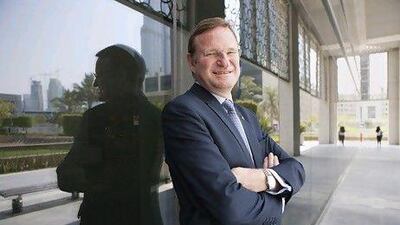The property market, hit hard during the fallout from the global financial crisis, is crucial to the continuing economic recovery of the UAE.
There have been some signs, at least in some parts of the sector, that prices and rents are increasing once more. Alan Robertson is the chief executive for the Middle East and North Africa (Mena) at Jones Lang LaSalle, a global group specialising in property consultancy, management and investment.
Here, he gives a snapshot view of the health of the property business in the Emirates and the region.
The consensus seems to be the UAE property market has bottomed out. What's your view?
I agree that parts of the UAE market have bottomed out but that cannot be said for all sectors. In the Dubai residential market, the best projects and locations have bottomed out and rents and prices are rising. This is particularly the case in the most popular villa locations. The largest shopping centres are also doing well, as are the beachfront hotels. However, the market for poorer quality and peripheral residential schemes continues to face difficult conditions, as do secondary retail schemes and a number of city centre hotels. In most parts of the Abu Dhabi market it is premature to say that things have bottomed out.
Can you explain the differences in the state of the property markets of Dubai and Abu Dhabi?
The two markets are at different stages of the property cycle, with Dubai around 18 to 24 months ahead of Abu Dhabi in most respects. In parts of the Dubai market [such as residential and retail] there is clear evidence of recovery whereas that is not yet evident in Abu Dhabi, where peak supply has still to come through. In the longer term, the two markets will begin to show more similar trends as they both continue to grow and experience recovery.
How is residential compared with commercial?
The residential market is generally in a healthier state than commercial at present. The office sector in both Abu Dhabi and Dubai continues to experience high vacancy rates and large supply pipelines, which means continuing downward pressure on rents. While there are selective shortages beginning to appear [especially for large units in Dubai in single ownership], conditions remain generally challenging for landlords. On the other side of the coin, this means that conditions are favourable for occupiers and, in time, these tenant-favourable conditions will benefit the whole economy as they stimulate demand from corporate occupiers.
A recently reported analysis by Dubai's Real Estate Regulatory Agency (Rera) apparently showed valuations had declined more than 25 per cent in the first half of this year. What's your opinion?
If I understood the Rera announcement correctly, what they were saying is that the cumulative value of the residential properties valued by them in the first half of this year was 26 per cent less than the properties they valued in the same period last year. It is not an especially representative sample of property in the emirate and does not mean that individual property values have dropped. On the contrary, market evidence shows that values for the best villa and apartment locations in Dubai have risen by as much as 10 per cent in the 12 months up to June.
What is Jones Lang LaSalle's view of the Dubai International Financial Centre (DIFC) property situation?
Within the DIFC there is considerable divergence in performance between the DIFC and third-party owned properties. The original properties, which are owned and managed by DIFC themselves, have very high occupancy rates and there is a waiting list of tenants for space that becomes available. On the other hand, the more recently developed schemes that are in third-party ownership and occupy more peripheral locations have very low occupancy rates. They do not benefit from the marketing support the DIFC authority gives to its own buildings and, as they tend to have been strata sold, there is very little in the way of coordinated marketing going on. I am not sure how the recent announcement regarding the changes to the structure of DIFC will change this but it should allow the property arm to develop greater real estate expertise and, through that, improve the overall quality of the estate.
How does the UAE compare with the rest of the Mena region?
UAE continues to be well placed compared with other parts of the Mena region in that the property market is the most developed, it is the most transparent, it has the best-quality stock and it offers a comparative ease of doing business. It continues to benefit from stable government and from its safe haven status. The main area of concern is the oversupply in certain sectors. That will sort itself out in time but in the short term it is likely to have a braking effect on the rental growth that would otherwise occur.

